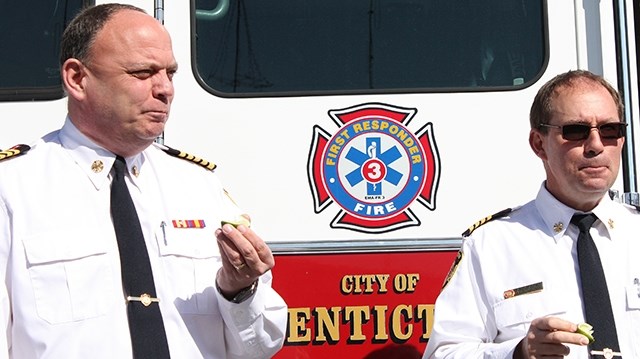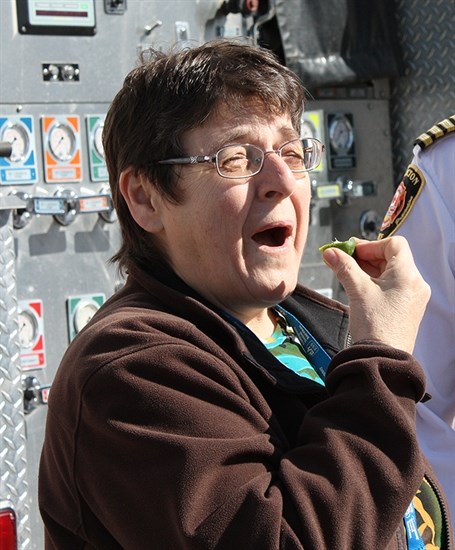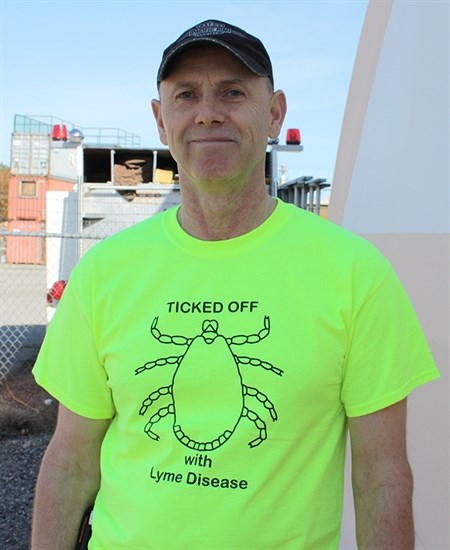
Penticton Fire Chief Wayne Williams and Deputy Chief Dave Spalding take the Lyme Sucks Challenge, Wednesday, April 15.
(STEVE ARSTAD / iNFOnews.ca)
April 15, 2015 - 12:33 PM
PENTICTON - The Lyme Sucks Challenge is spreading in Penticton - hopefully faster than the disease itself.
Penticton RCMP took the challenge last week, and on Wednesday, April 15, it was the Penticton Fire Department’s turn.
The Lyme Sucks Challenge involves being filmed while sucking on half of a lime, nominating three others to take the challenge and posting the video on social media.
Thirteen firefighters took part in this week’s event. Penticton Fire Chief Wayne Williams challenged Emergency Social Services and B.C. Ambulance, while Captain Graham Gowe put the challenge out to all B.C. professional firefighters.
Following the firefighter’s challenge, Penticton Emergency Social Services Director Bonny Billups also stepped up to the challenge, daring Emergency Social Service support staff and the Second Penticton Cub Scouts, Beavers and Venturers to take the challenge.

Emergency Social Services Director Bonny Billups takes on the challenge.
(STEVE ARSTAD / iNFOnews.ca)
Penticton residents Sue and Gary McDougall organized the Wednesday event as they did last week’s challenge with the RCMP. The two have worked tirelessly to get the message out about Lyme disease since Sue contracted the disease seven years ago.
Canadian Lyme Disease Foundation President Jim Wilson also attended the event. He said the foundation was still 'working hard to beat down the doors' to change the attitude of the medical profession regarding the prevalence of the disease across North America.
“They’re under the impression it’s much more rare than it is, and we’re doing our best to insist the medical leadership educate their own practitioners,” he said.
Wilson said proper diagnosis and initial treatment was all important in treating the disease.
“We want the patient to get that all important initial recognition and treatment, because that’s the magic window for this disease, diagnosing it early. Unfortunately in Canada, doctors have been told to expect this nice, distinct bull’s eye rash, unfortunately, fewer than 50 per cent get any rash, and of those only nine per cent get that distinctive rash,” he said.
Wilson said they were trying to get medical professionals together with the foundations’ own experts.
“In the U.S., the Centre for Disease Control has announced they’ve been missing it for decades. Instead of 30,000 cases a year, it’s 300,000 cases a year, so they were missing it ten-fold. We’re in a similar situation in Canada,” Wilson said.
Using current DNA technology, it is now possible to sample patients for lyme disease bacteria. The next challenge for Lyme disease treatment involves sorting out the background noise of sequencing to isolate the DNA of the actual bacteria, Wilson said.
Penticton resident Ken Hope attended Wednesday’s challenge to lend support and help out. He contracted lyme disease in 2000, and suffered from its effects until two years ago when he finally found out it was Lyme disease was causing his symptoms.
Hope was tested in the U.S., where he was told he met Centre for Disease Control criteria for Lyme.
“There is no treatment or insurance coverage for it in Canada,” he said.
Initially his symptoms included irritable bowel syndrome, and stomach cramps, but the disease also presented other symptoms such as fatigue, muscle cramps and a rash. Hope said he was diagnosed with an auto-immune disease but a mix up in medication almost killed him.
“I had to take charge. The medical system is geared to treat symptoms, not what’s causing them,” Hope said. He began learning about the lyme on his own, got tested two years ago and found himself improving on the subsequent treatment.
“There is hope. It takes quite a bit of work, but people need to find out what works for them,” he said.

Penticton resident Ken Hope realized he had Lyme disease after being tested in the U.S.
(STEVE ARSTAD / iNFOnews.ca)
To contact the reporter for this story, email Steve Arstad at sarstad@infonews.ca or call 250-488-3065. To contact the editor, email mjones@infonews.ca or call 250-718-2724.
News from © iNFOnews, 2015